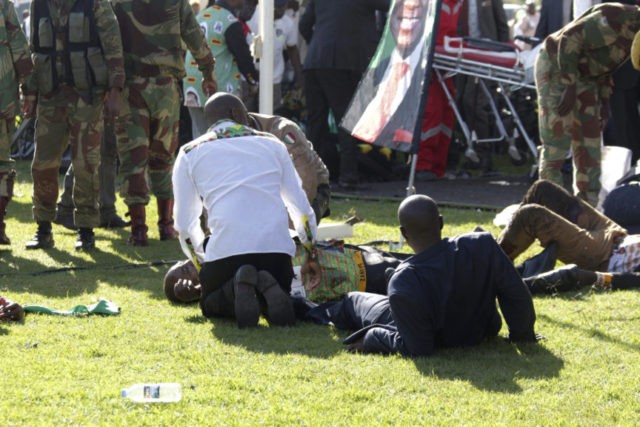Zimbabwean police on Wednesday announced the arrest of two suspects in connection with the June 23 grenade attack on an election rally held by the ruling Zanu-PF party.
The bombing has been described as an attempt to assassinate interim President Emmerson Mnangagwa, who is running for a full term in the July 30 election.
The explosion at a rally in Zimbabwe’s second-largest city of Bulawayo two weeks ago was caught on video. Several people were injured, including Vice President Kembo Mohadi and the wife of Zimbabwe’s other vice president, Constantino Chiwenga. According to the Mnangagwa administration, two people were killed in the bombing and 49 others were injured.
Vice President Mohadi was injured in the leg, treated at a local hospital, and taken to South Africa for further treatment. He is scheduled to address his first rally since the bombing on Wednesday.
“It exploded a few meters away from me, but it is not my time,” Mnangagwa said in an interview the night after the blast.
The July presidential election will be the first one held since longtime dictator Robert Mugabe was ousted in November 2017. Fears that the grenade attack would spark widespread election violence – a reasonable concern given the history of Zimbabwean political bloodshed – have not been realized so far.
Conversely, some suspect the attack was arranged as a pretext for ordering a military crackdown on the opposition. The Zimbabwe Defense Force vowed on Wednesday that it would have “no direct role in the upcoming elections” despite what it called “false reports” to the contrary.
According to the police account of the attack, the assailant was a young male who made his way through the crowd, got as close to the stage as possible, threw a grenade at Mnangagwa, and missed. Security sources say the president’s life was saved because the grenade hit one of the ropes holding up the VIP tent at the rally.
The two suspects arrested by the police were reportedly released after an interview. Authorities provided few details about their identity or the reason for their arrest.
“We continue to appeal for more information which may enable us to bring to book whoever had a hand in this nefarious act,” said police commissioner Godwin Matanga.
Mnangagwa blamed the assassination attempt on a faction of the Zanu-PF party headed by Grace Mugabe, the much younger wife of the nonagenarian former dictator. Mnangagwa cheerfully admitted this was a “hunch without evidence,” although he implicated Mugabe’s G40 faction in a number of previous political assassination attempts.
The police have indicated Grace Mugabe is a person of interest in the investigation but they are having trouble finding her, as she is believed to be living somewhere in South Africa at the moment.
The chain of events leading to Mugabe’s fall began with the sacking of Mnangagwa, who was vice president at the time. Observers interpreted his dismissal as a ploy to clear the way for Grace Mugabe to take over the dictatorship after her husband retired. Zimbabweans widely despised Grace Mugabe for maintaining an extravagant lifestyle even as the Zimbabwean economy plunged into a Marxist abyss, and is the subject of several corruption investigations.
Another theory of the grenade attack is that Mnangagwa has enemies in his administration and party leadership, prominently including Vice President Constantino Chiwenga, previously the military leader in charge of the oddly relaxed coup that dethroned Robert Mugabe. A longtime supporter of Mugabe and willing instrument of his oppression, Chiwenga said he was infuriated by the sacking of Mnangagwa and realized it was time to overthrow the regime he had long supported.
Chiwenga stated in June that the coup, formally designated “Operation Restore Legacy,” was a one-time action that will not be repeated.
“People were not sure of what tomorrow would hold for them. There was no policy consistency, people who were not constitutionally in government were making decisions and even battering the judicial service, firing people left right and center,” he said of Mugabe’s last days in power.
Tensions have steadily grown between Mnangagwa and Chiwenga since the coup, in part because the interim president believes Chiwenga and his supporters in the military have been maneuvering to block Mnangagwa allies from power in both the government and Zanu-PF.
Mnangagwa’s faction accuses Chiwenga of plotting another soft coup to bring the government more fully under military control, possibly by forcing the 75-year-old Mnangagwa to accept a deal where he wins the July 30 election, serves one full term as president, and then steps aside for Chiwenga.
Each faction appears to quietly suspect the other of complicity in the grenade attack on the Bulawayo rally, on the theory that both Mnangagwa and Chiwenga are the sort of men who would be willing to arrange for someone to toss a grenade onto a stage where they happened to be standing in order to remove a political rival.
“Tension has been simmering between the two for some time despite the show of unity in public. Given that there has been mistrust between the two most powerful persons in the country and that the target and motive of the attack has not been established, it is difficult to rule out the possibility that the attack could have originated from the unresolved leadership issues,” a Zanu-PF official said last week.
Notably, almost no one in any Zimbabwean faction appears to believe the grenade attack might have been an act of revenge for past massacres Mnangagwa and/or Chiwenga were involved in. Nearly every official who speaks to Zimbabwean media about the Bulawayo bombing assumes it is part of some current power struggle.

COMMENTS
Please let us know if you're having issues with commenting.